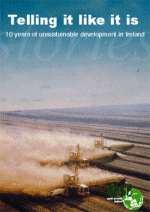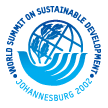Irish NGOs Highlight Environmental Costs of the Celtic Tiger at Earth Summit
 national |
environment |
feature
national |
environment |
feature  Thursday August 22, 2002 03:32
Thursday August 22, 2002 03:32 by IMC Editorial Group - IMC Ireland
by IMC Editorial Group - IMC Ireland
 Representatives of Irish environmental NGOs are in Johannesburg
countering the government glossover of the serious social and
environmental costs of the Celtic Tiger. Under the banner of Earth Summit Ireland
groups ranging from An Taisce
and Coastwatch to Friends of the
Irish Environment and the Irish
Peatland Conservation Council have produced a comprehensive report
highlighting a wide range of deeply unsustainable practices occuring
in Ireland.
Representatives of Irish environmental NGOs are in Johannesburg
countering the government glossover of the serious social and
environmental costs of the Celtic Tiger. Under the banner of Earth Summit Ireland
groups ranging from An Taisce
and Coastwatch to Friends of the
Irish Environment and the Irish
Peatland Conservation Council have produced a comprehensive report
highlighting a wide range of deeply unsustainable practices occuring
in Ireland.
'Telling it like it is - 10 years of unsustainable development in Ireland', uses 34 stories of unsustainable practices in Ireland as examples of how the government has paid only lip service to the main international environmental treaties that it has signed. Since Ireland is held up internationally as a model of development through the pursuit of globalisation and neo-liberal policies, this report is globally important to show the international community that the Celtic Tiger has not been cost-free.
The report describes how Ireland is burning its last remaining boglands at a rate of 1,500 ha per year to put even more carbon dioxide into the atmosphere. Another story highlights the mercuric soap factory that was expelled from Britain for poisoning its workers, which sells a toxic and illegal product to Africa - and that got £750,000 from the IDA. There's an overview of how local authorities in Galway ignored over half of the 3,266 submissions received about a controversial road project because they were deemed to be 'in the wrong envelopes' and of the Aghafad 'pig production unit' in which 100,000 pigs are crammed onto a 40 acre site in a factory 'farm' of horrific suffering and vast pollution? Other stories contrast the obsession with road building with the decay of public transportation, the continued favouring of landfill over recycling, and how Ireland is ignoring its obligations under the Kyoto Protocol on climate change.
 The World Summit on Sustainable Development is taking place
in Johannesburg from August 26 to September 4. It is a follow-up to
the Rio Earth Summit held 10 years ago which produced many
aspirational statements but little real action. It is becoming
clearer to NGOs, activists and those concerned with global
environmental destruction and social inequality that the problem
lies in the almost complete absence of political will. This lack of
will to introduce change in the direction of sustainability is
particularly probounced in Ireland where companies, local
authorities and successive governments seem content to pass on the
huge costs of overconsumption to future generations.
The World Summit on Sustainable Development is taking place
in Johannesburg from August 26 to September 4. It is a follow-up to
the Rio Earth Summit held 10 years ago which produced many
aspirational statements but little real action. It is becoming
clearer to NGOs, activists and those concerned with global
environmental destruction and social inequality that the problem
lies in the almost complete absence of political will. This lack of
will to introduce change in the direction of sustainability is
particularly probounced in Ireland where companies, local
authorities and successive governments seem content to pass on the
huge costs of overconsumption to future generations.